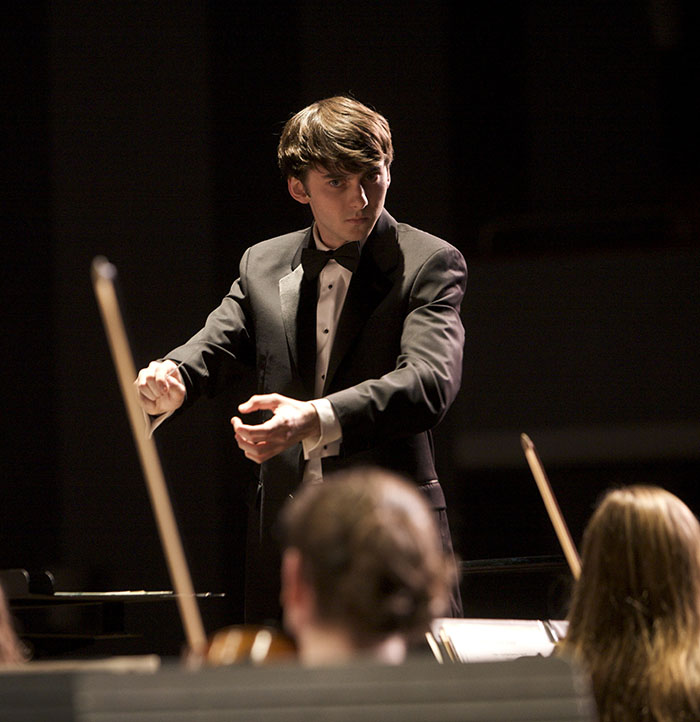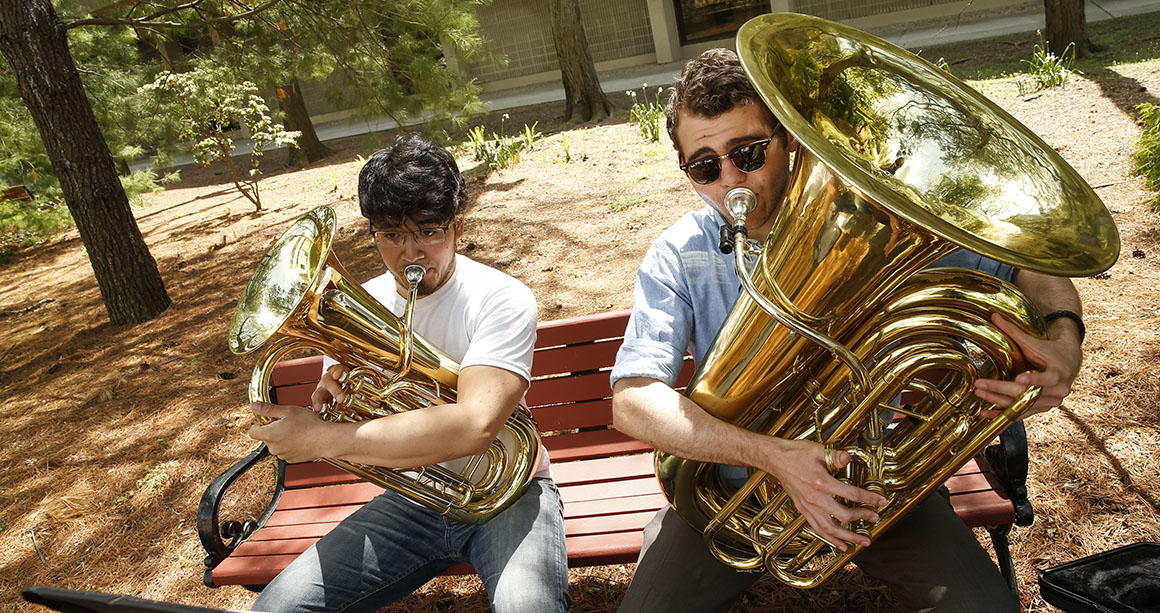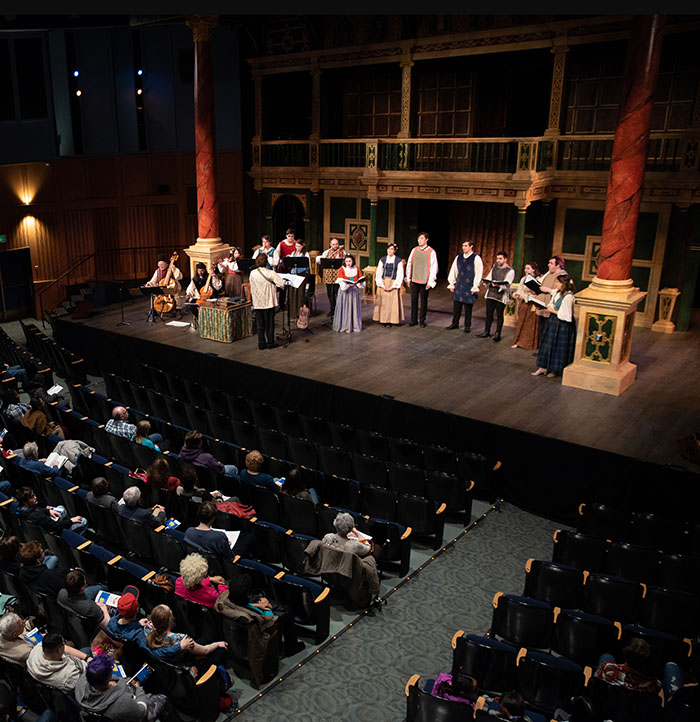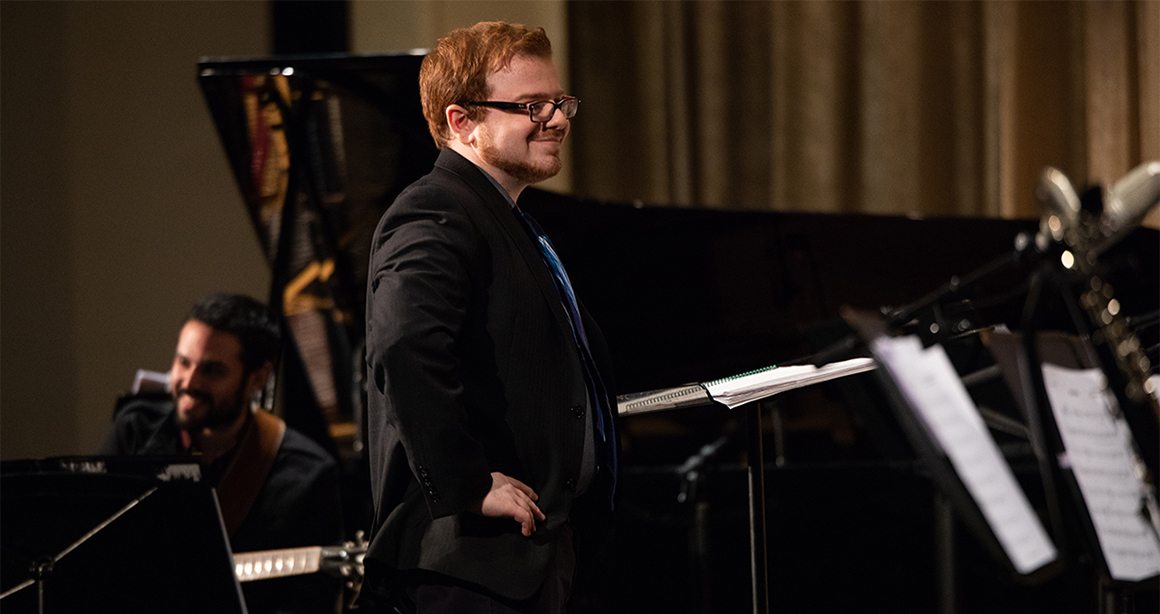Do you dream of a career writing music for the concert stage, television, or film? Hofstra's music theory & composition program will nurture your talent and your technique while preparing you for your future in this exciting field.
Overview
The foundation of this program is a core music curriculum, centered on theory, history, and musicianship, providing a solid foundation for a career in the art of music.

The program in composition trains students in the craft of writing music in a variety of styles, both historical and contemporary, and nurtures their creativity and personal artistic expression. The culmination of the degree is a full senior recital representing the individual student's personal creative growth and musical interests throughout their four years of coursework and lessons.
Our campus location – an easy train ride to New York City – gives students countless opportunities to hear new music live while networking with industry professionals.
More About the Program
All students wishing to declare a BS or BSEd in Music in any concentration (music performance, music business, music education, music theory/composition, jazz and commercial music, or music history/literature) must audition for acceptance into these programs.

Making Music
The Music Department at Hofstra is a tight-knit community. Classes, rehearsals, and private lessons fill the lives of most music majors. Clubs and extracurricular activities offer students additional opportunities to perform, network, and socialize.
Department Ensembles
Hofstra's major ensembles include the Symphonic Band, Symphony Orchestra, Chamber Orchestra, University Mixed Chorus, Wind Ensemble, and Chorale. Hofstra’s chamber ensembles include the Hofstra Collegium Musicum, which performs as part of our annual Shakespeare Festival; the Tuba/Euphonium Ensemble, the centerpiece of our annual fall OcTubafest concert; the Woodwind Ensemble; the Chamber Choir; the Brass Ensemble; Vocal Jazz; various quintets, quartets, duos, and trios; and many more.
Other performance opportunities are available through our unique program in Sikh Musicology as well as the Hofstra Opera Theater, which presents a fully staged opera every year, with all leads and choral members cast from the undergraduate population.
Student Clubs
In addition to the department-sponsored ensembles, many student clubs serve as extensions of Hofstra's music programs. Consider joining one of Hofstra's competitive a cappella singing groups: Sigma'Cappella, The Hofbeats, Makin' Treble, Chai Notes, and The Dutchmen. The Hofstra Gospel Ensemble and the SOS Brigade are also for music-minded students.
Student Recitals
All theory and composition students are required present solo junior and senior recitals. The department provides the recital space, coaching support, and tools for students to produce a successful recital as part of their degree.
Learn from the Experts
Your professors include composers who have written music for TV and film, including the popular theme to Sex in the City. The Santa Fe Opera, Minnesota Opera, the American Composers’ Orchestra, Anonymous Four, Chanticleer, the string quartet Ethel, and the Paquito D’Rivera Trio are among the prominent companies and ensembles to commission and perform their work. Their music has been featured on national television broadcasts, including PBS’s Great Performances, and at prestigious venues, including Carnegie Hall, the Brooklyn Academy of Music, and the Metropolitan Museum of Art. Members of our theory faculty have written and edited books published by major scholarly presses, published numerous articles in international journals, and served as officers of major professional societies.



Facilities and Resources
Joseph G. Shapiro Family Hall is home to the Department of Music's faculty, studios, and state-of-the-art large rehearsal spaces. Daniel L. Monroe Lecture Center houses additional studios and classrooms, rehearsal rooms, and the Music Library, which supports the curriculum of the Department of Music by providing scores, study space, and listening material.
Our performance spaces include the 377-seat Helene Fortunoff Theater (for recitals and chamber group performances) and the 1,105-seat John Cranford Adams Playhouse (for major ensembles).



Alum Honored with National Prize in Jazz Composition
Music Education alumnus Robert Buonaspina ’19 has a lot to smile about lately. His original big band work, “Smile Pretty,” recently won the coveted 2021 International Society of Jazz Arrangers & Composers [ISJAC]/USF Prize in Jazz Composition.

Alumni Outlook
Hofstra music majors graduate with a combination of classroom instruction and professional experiences that are highly regarded in today's competitive job market.
Areas of the music industry where our graduates are working:
In addition to performing, our graduates are working in education, music management, marketing and public relations, sound engineering, and music publishing. They are also working for performance venues, record labels, and recording studios.
By the numbers:
- 93% of recent alumni responding to a survey reported they were working or enrolled in graduate school within a year of graduation
- Among recent graduates who reported they were employed, 100% landed their job within three months of graduation
- $41,000 is the mean salary for the first year following graduation for students in the School of Humanities, Fine and Performing Arts.
Continuing their studies:
Additionally, many of our alumni are pursuing or planning to pursue advanced degrees in music and music education at institutions such as CUNY Brooklyn College, CUNY Queens College, Georgia State University, Hebrew College, Hofstra University, Manhattan School of Music, Roosevelt University, and Vermont College of Fine Arts-Music.